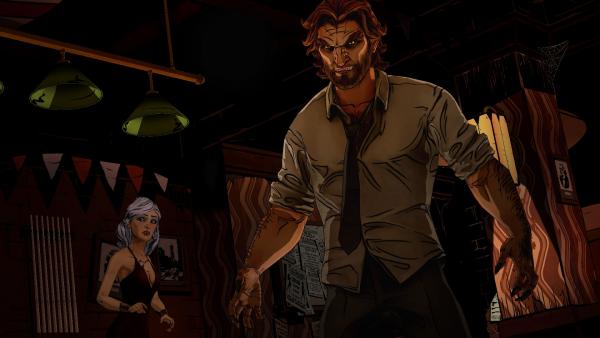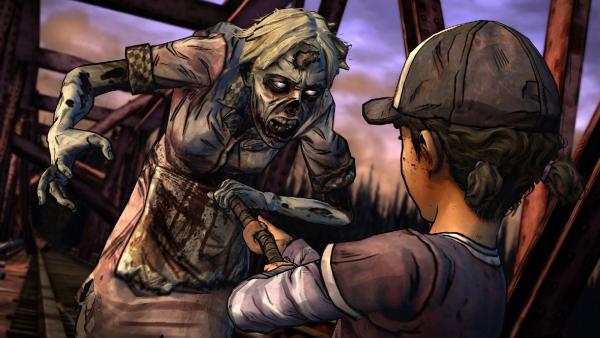Telltale games has a reputation for creating compelling, character-driven, adventure games based on popular comic book and television series, such as the award-winning The Walking Dead: Season 1. Each game season is comprised a number of episodes, which release at regular intervals, with story outcomes that are guided by critical decisions players make throughout. Telltale’s other breakthrough hits include The Wolf Among Us (based on the Fables comic books), Game of Thrones, and Tales from the Borderlands (based on the Borderlands video game franchise) along with many others.
The company shows no sign of slowing down, with the recent release of Minecraft: Story Mode, an adventure set in the best-selling Minecraft game universe, along with another game set in The Walking Dead universe, and the announcement of an upcoming series based on the Batman comic books.
[a]listdaily speaks to Steve Allison, Senior Vice President of Publishing at Telltale Games, to talk about how these partnerships have grown, what it takes to promote an adventure game in today’s market, and what gaming might look like in the coming year.
Telltale recently announced an upcoming game based on the Batman comic books. Tell us a little about how this partnership came about.
We’re huge fans of Batman here at Telltale and have had an established working relationship with Warner & DC Comics now for a few years that started with The Wolf Among Us. It’s pretty safe to say we earned a great deal of their trust with the work we did on their Fables IP with Wolf and we’d been expressing our interest on Batman for quite some time. It all worked out and were super excited with what we’re going to bring to fans next year.
 Telltale has partnered to create adventure games based in diverse worlds such as Game of Thrones, The Walking Dead, Borderlands and Minecraft. How do you decide which projects to pursue
Telltale has partnered to create adventure games based in diverse worlds such as Game of Thrones, The Walking Dead, Borderlands and Minecraft. How do you decide which projects to pursue
When we decide on a license there’s a bit of science on the front end about the size of the potential addressable audience for a Telltale game based on the size of the IP and in combination that can mean book sales, box office grosses, games sold, WW TV ratings or a combination of some/all those things depending on the IP. We also look at intangible passion for franchises which shows up more in pop culture or things like Google Trends and that points us at a pretty short list. After that bit of work it matters if we as a team have passion for the things on that list and if they are available to us and then we take things from there as far as trying to partner up with folks. In all cases to date have initiated every conversation that led to a product based on this internal process. It’s also important to note that demographics for franchises are also an important part of working through the potential of an IP as a Telltale Games series. We are really focused on the 17-35 year old demographic here and what that IP that group is passionate about.
How do you make single-player adventure games stand out in a market dominated by fast-paced action games
People love narrative. It’s what drives TV, books and film – and it’s what drives our products. We make interactive scripted entertainment that works on devices that have large 17-35 year old audiences and we seek to work on franchises that those people are passionate about. The difference that makes a Telltale Game Series different than TV/Books/Film is that we give folks “a lean in†scripted entertainment experience in which they can participate and influence the narrative based on what they choose to say, or do – to jump into a story rather than sit back and consume it. In that sense we compliment fast paced action games and live in harmony with them. Hardcore gamers, casual gamers and all players in between can enjoy what we do because it is about the crafted story experience we provide based on an IP people are passionate about, and our teams are passionate about making.
What are the challenges in promoting an episodic game series, especially ones that release for console, PC and mobile platforms
What makes us different in terms of how we stand out from other game genres is also our biggest challenge. We aren’t a twitch based action experience, we make stories that you get to play and influence which gives you a tailored experience based on what you say and do. It’s a heady thing and challenging to explain that to the broad market and we constantly are working on optimizing how we do that. Also cadence in the delivery of our episodes is critical, especially once you get people who are really into what you’re doing, they want their episodes on a reasonable schedule. We have struggled with that at times in the post Walking Dead Season 1 era and there is nothing more important to us than giving great episodes on a nice cadence at the moment. We’ve been able to do this on Minecraft: Story Mode and we’re working hard to maintain that on the things that follow.
 What would you say players love most about Telltale Games’ adventures, and how do you grow that audience
What would you say players love most about Telltale Games’ adventures, and how do you grow that audience
When we deliver a good story and within that story a good role playing experience that hits an emotional chord, it’s in those moments that we make fans for life. Whether it’s a shocking dramatic moment or making someone cry when we craft those right and they hit we really hook a large group of people who keep coming back for more. We grow our audiences by expanding our demographics.
Minecraft: Story Mode appeals to a large group of 10-17 year old players that is pretty new for us in addition to the very large 17-35 year old audience and we’re likely going to explore some projects that can appeal to this 10-17 year old group in the future if it makes sense. We also have a strong pattern of cross franchise buying that has grown over the years that transcends the vertical nature of having a range of licenses and appealing just to each core audience, we now have real Telltale fans that do buy and play everything we make and that has really grown year over year.
What are your thoughts on virtual reality technology, and how do you think it will impact video gaming
We are very interested in VR. In the abstract telling a crafted story in the VR space is an exciting problem to try and solve and we talk about it often. There’s also the idea of adding extended VR experiences to our game series that are affected and influenced by playing one of our regular game series enhancing the overall experience for someone who has a VR setup. We’ll definitely be talking about our plans for VR publicly attached to a project of ours in the next year.
How do you see video games continuing to grow and change in the coming year
The range of interactive content that’s available that have successfully defied traditional gaming conventions has grown exponentially in the last few years in terms of what people are playing in mobile, home console and PC.
The range of successful new types of games that are mega hits is astounding; from Clash of Clans on mobile, or the types of content we’ve been able to bring out very successfully across all platforms, to the types of games we see coming out of Steam Early Access that are legitimate multi-million unit sellers that will go on to even bigger things on console born from the approach games like Minecraft created not that long ago. It’s just an amazing time for our industry.
These pathways to success defy the traditional publishing model and we’re going to continue to see big products born by companies who leverage the evolution of our business in the coming 1-2 years. VR is going to be an interesting catalyst as well.

